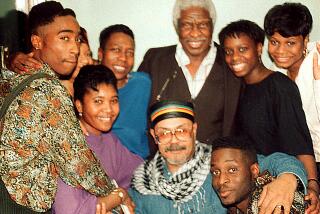Tribute Demonstrates How Tapscott’s Legacy Lives On
- Share via
“Inspirational” may be the best word to describe the Horace Tapscott tribute at the Jazz Bakery on Sunday afternoon. Inspirational in honoring the memory of one of the Southland’s most visionary musicians; inspirational in revealing the power and the spirit that persist in his artistic teachings.
Tapscott founded the Pan Afrikan People’s Arkestra in the late ‘70s in an effort to provide a cultural organization that would embrace jazz, dance, singing and poetry within a milieu that also encompassed the various art forms’ African roots. The collective has continued, with changing lineups of singers, players, dancers and poets, as the Union of God’s Musicians and Artists Ascension.
Sunday’s program included no less than 16 musicians, led by Arkestra director Michael Session, eleven singers (in “The Great Voice of UGMAA”) led by the remarkable vocalist Dwight Tribble, and the poet Kamau Daa’oud.
Understandably, there were some random moments of confusion, both logistical and musical. Moving that many performers on and off the Bakery’s small stage and organizing them into a coherent musical ensemble was a considerable task, and Session deserves credit for handling it in an efficient, good-natured manner.
The selections ranged widely, from Tapscott and McCoy Tyner pieces to John Coltrane’s “Giant Steps.” Daa’oud rendered a deeply touching tribute to Tapscott, and the program climaxed with the entire company performing Tapscott’s “Little Africa,” a piece traditionally used as a closer by the ensemble.
*
With that many artists and that much music, the high points came with great profusion--too many to mention in detail. But some notice must be given to Session’s consistently fine alto and soprano saxophone work (delivered between his leadership duties), the rhapsodic piano of Nate Morgan and the brawny, hard-driving tenor saxophone soloing of Billy Harris.
In addition, hearing Daa’oud’s expressive voice offering his richly metaphoric poetry was a wonder, as was the extraordinary vocalizing of Tribble, surely one of the most creative voices in today’s jazz world.
But ultimately, of course, the spotlight belonged to the memory of Tapscott (who died in 1999), and to the continuing impact that his work is having--despite its far-too-slim recognition--upon the Southland creative community.
More to Read
The biggest entertainment stories
Get our big stories about Hollywood, film, television, music, arts, culture and more right in your inbox as soon as they publish.
You may occasionally receive promotional content from the Los Angeles Times.










